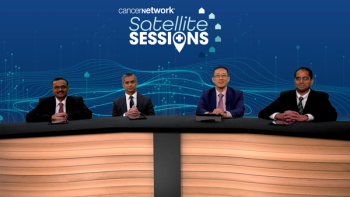
Surgeons, radiation oncologists, and medical oncologists gathered to discuss treatment options and approaches for NSCLC.

Your AI-Trained Oncology Knowledge Connection!


Surgeons, radiation oncologists, and medical oncologists gathered to discuss treatment options and approaches for NSCLC.

Dr. Gregory Gan presents Case 4, featuring a 71-year-old diagnosed with Stage IIIA NSCLC experiencing pneumonitis following Chemo-IO treatment, prompting a discussion with expert insight on the monitoring and management of this condition.

Dr. Gregory Gan introduces Case 2, involving a 70-year-old former smoker with Stage IIIB NSCLC and a PD-L1 level of 10%, prompting discussion with emphasis on the importance of shared decision-making with the patient and their caregivers.

Dr. Gregory Gan introduces Case 2, featuring an 82-year-old former smoker with poorly differentiated lung adenocarcinoma and a PD-L1 level of 85%, initiating a conversation on the role of a multidisciplinary approach to treatment and consideration factors for surgical and radiotherapy interventions.

Gregory Gan, MD, presents Case 1 involving a 72-year-old former smoker with Stage-IIIA NSCLC and a PD-L1 level of 90%, initiating a discussion on the treatment and management of the case.

University of Kansas experts offer guidance for community practitioners treating non-small cell lung cancer (NSCLC).

Dr. Reddy offers expert insights on employing concurrent immunotherapy with chemoradiotherapy, discussing the approach's role and drawing from recent data, such as results from the KEYNOTE-799, PACIFIC-6, and DOLPHIN studies, to inform treatment strategies.

A group of experts in oncology investigates the feasibility of combination adjuvant immunotherapy in NSCLC consolidation, assessing the utilization of multiple immune checkpoint inhibitors and scrutinizing the rationale, with a focus on findings from the COAST study and PACIFIC-8 studies.

Vinay Raja, MD, explores the management of patients with Stage-III disease and actionable EGFR/ALK aberrations, as well as the treatment approach for patients with PD-L1 <1%.

A panel of oncology experts examine the role of consolidation immunotherapy in patients receiving concurrent chemoradiotherapy for unresectable Stage-III NSCLC, discussing 5-year survival outcomes from the PACIFIC trial, the impact on institutional treatment approaches, criteria for selecting patients for consolidation durvalumab, the significance of baseline scans, as well as exploring real-world evidence on consolidation durvalumab.

Krishna Reddy, MD, PhD, explores the roles of sequential and concurrent chemoradiotherapy (sCRT and cCRT) in patients with unresectable stage III NSCLC, delving into considerations for selecting between the two approaches and examining potential variations in treatment based on factors such as age, performance status (PS), or comorbidities.

Gregory Gan, MD, briefly outlines the available treatment strategies for stage III unresectable NSCLC, and Alykhan Nagji, MD explores the characterization of patients with unresectable stage III NSCLC, underscoring the crucial role of accurate staging in guiding treatment decisions.

Oncology experts from the University of Kansas discuss treatment strategies for both resectable and unresectable non-small cell lung cancer (NSCLC) following progression on adjuvant immunotherapy, providing valuable insights into navigating the challenges posed by this evolving clinical scenario.

Vinay Raja, MD, explores the crucial role of adjuvant immunotherapy in resectable stage III NSCLC, providing insights into patient selection criteria, considerations for choosing among available treatment options, and the impact of recent trial data updates on informing treatment decisions in this evolving therapeutic landscape.

Oncology experts from the University of Kansas discuss the evolving role of neoadjuvant/perioperative immunotherapy in resectable stage-III NSCLC, analyzing recent trial data and addressing the nuanced factors that inform their decisions between neoadjuvant and perioperative treatments in clinical practice.

Alykhan Nagji, MD, provides an overview of the institutional approach to determining eligibility for surgical resection, delving into the pivotal role of the multidisciplinary tumor board in the decision-making process and exploring the crucial factors that must be considered when evaluating resectability.

Alykhan Nagji, MD, provides a brief overview of the landscape surrounding the treatment of patients with stage-III resectable NSCLC.